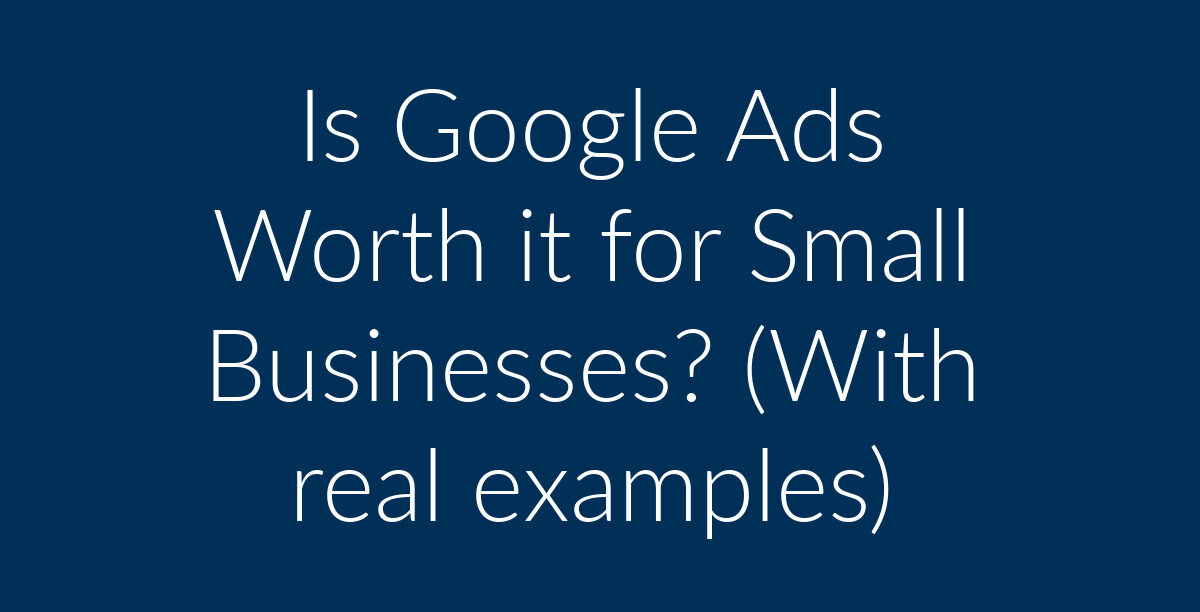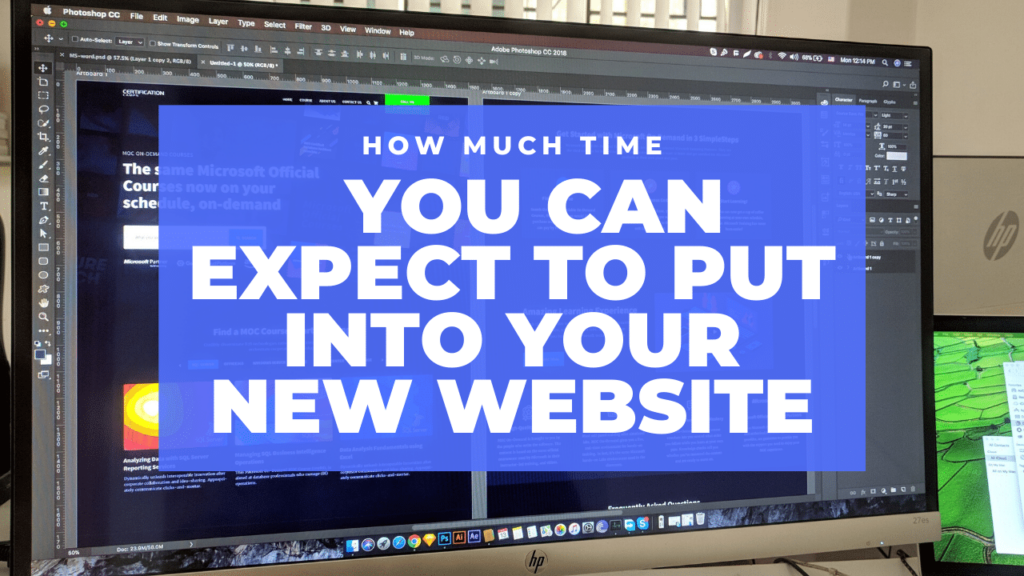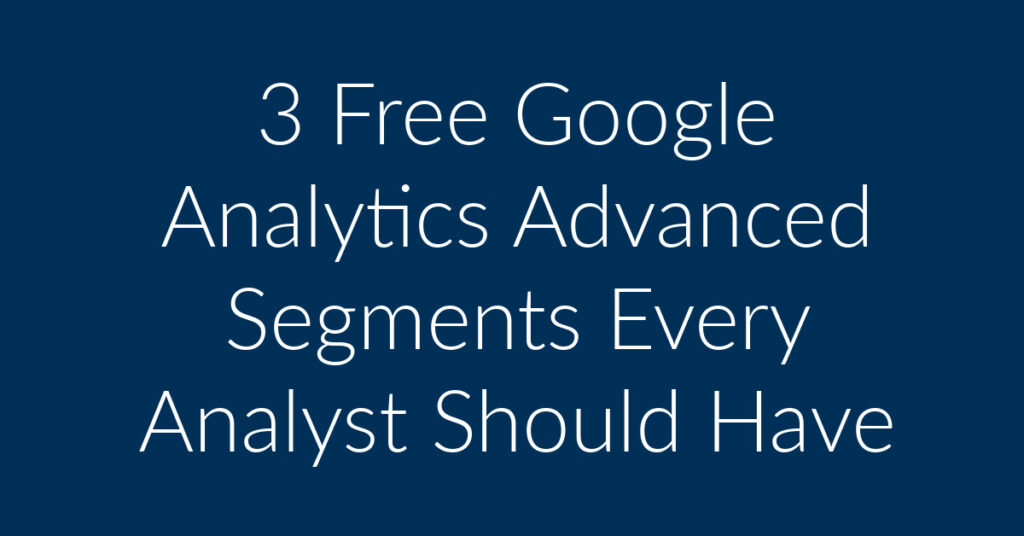Are you the owner of a small business? Have you been wondering whether or not to advertise via Google Ads? If yes, then you have come to the right place. My name is Francisco and I am the owner of Planet Marketing, a digital marketing agency. We focus on Google Ads, Facebook ads and Remarketing. One of the questions that I get asked from time to time is: “is Google Ads worth it for small businesses?” That is why I have decided to write this post. The aim is to give small business owners all the information that they need to make the right decisions. In this article, I am going to:
- Introduce you to Google Ads
- Give you a brief summary of Google’s Keyword Planner
- Use real examples to show whether or not small businesses should bother with Google Ads
- Summarize Google Ads’ benefits for small businesses
Let’s get started!
Small businesses, for the most part, have rather limited budgets. With so many parts of the business demanding a slice of the pie, advertising usually ends up taking a backseat in terms of resources allocation. The little that is set aside for marketing, therefore, needs to be used both efficiently and effectively. Considering these constraints, people are often not sure whether or not Google Ads is the best option when it comes to reaching out to prospective customers.
How does Google Ads work?
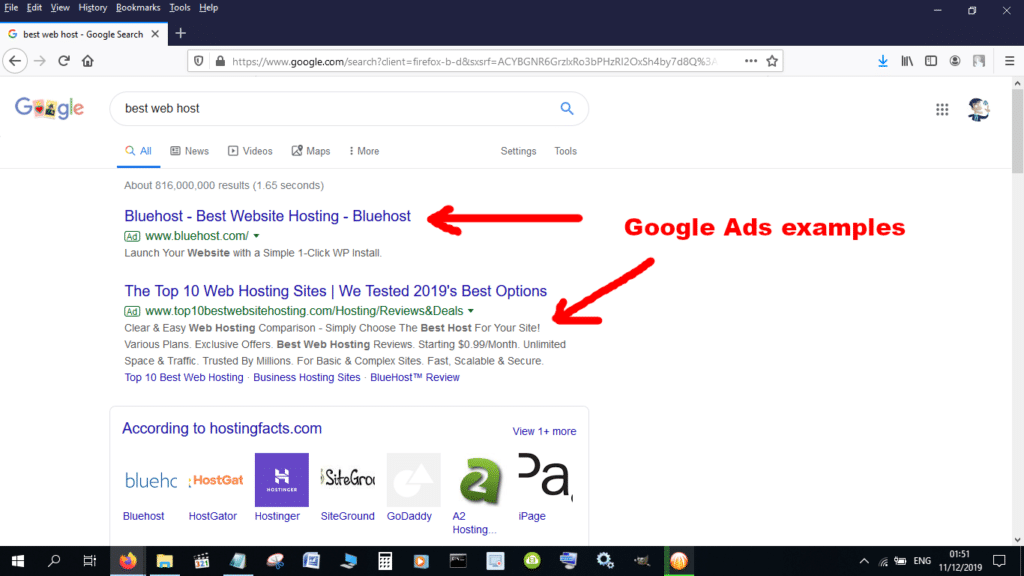
Google Ads are all around us. Carry out a search today, and you are likely to come across them. With Google Ads, businesses bid to have their ads appear on top of search result pages. This happens on Google’s Search Network, which uses text ads that are charged per click. It’s worth noting that the ads that get displayed are largely dependent on location. Someone in Pretoria, South Africa, is going to get different results from someone in Chula Vista, California. That’s only logical, if you come to think of it! It wouldn’t do to have results from Colombia displayed for a local search that’s made in DC!
How are ad positions determined?
Google, as already noted, uses a bidding system when displaying ads from brands that are competing for the same keywords. Does this mean, therefore, the higher the bid the higher the SERPs placement? Well, not so fast! While that may be true, to a small extent, there are other factors that determine placement for Google Ads. One of these is an ad’s quality score. Ads that have a higher quality score can appear at the top, in spite of having lower bids than competing ads.
Keyword Planner
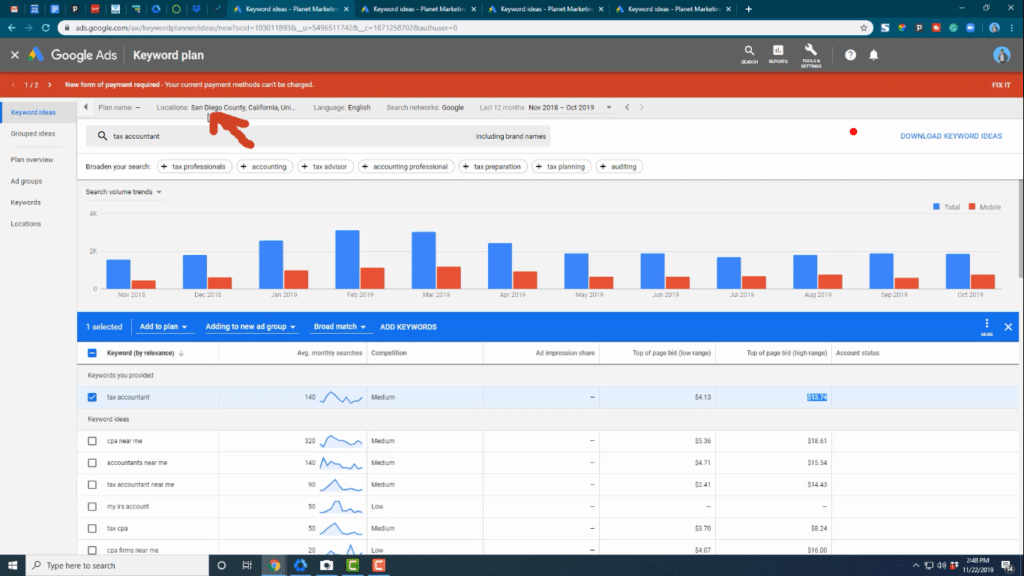
Note that all the things that I talk about in this article are going to be dependent on what part of Planet Earth you are in. I am in San Diego, so I have changed the settings in my Google Ads account to San Diego County, California. I will be using Google’s Keyword Planner to show you whether or not Google Ads is worth it for a particular line of small business. You need a Google Ads account to use Keyword Planner. To get to the keyword planning tool, here is what you need to do:
- Log into your Google Ads account
- Go to “Tools and Settings”
- Click on “Keyword Planner”
Keyword planning is important
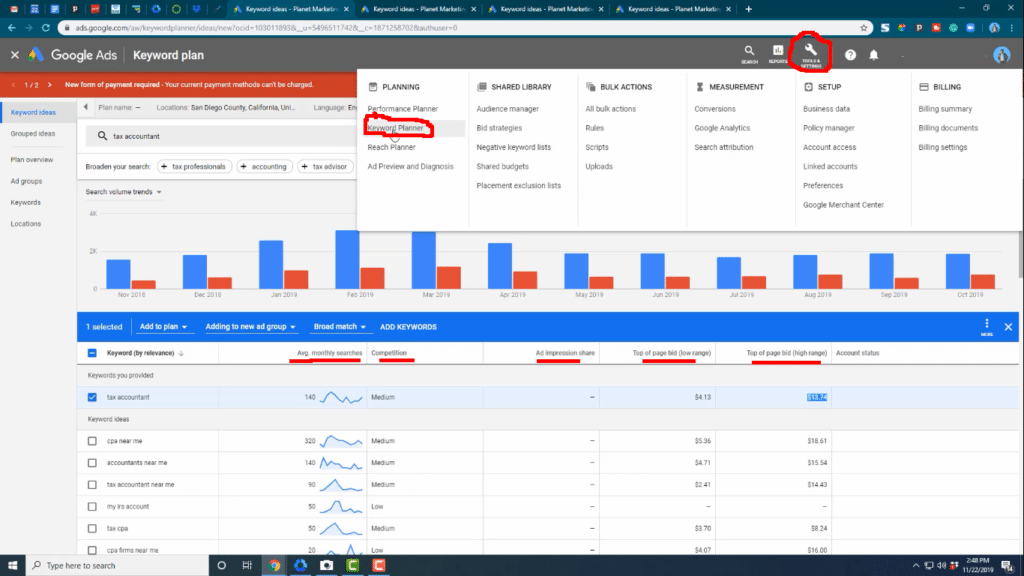
Google’s Keyword Planner is definitely one of the most useful SEO tools that you will find out there. Not only does it come free of charge, but it also allows you to have a clearer understanding of your target keywords. If you have ever used other SEO tools such as SEMrush, you will understand that getting the best keyword planning tool does not usually come cheap. Keyword Planner, as you can see in the above screenshot, provides you with a number of useful metrics. This includes the following:
- Search volume trends: Google’s keyword planning tool allows you to see the overall performance of your chosen keyword over the past 12 months. It also shows you the trends on mobile devices over the same period. Having this information at your fingertips is important. It allows you to see whether or not your focus, both in terms of SEO and in terms of Google Ads, should be on mobile devices, on desktop devices or on both.
- Average monthly searches: Keyword planner also shows you the average monthly searches for your chosen keyword. Obviously, the higher the search volume, the better from an advertising point of view. However, you need to be careful here, since everything is not as it looks. For one thing, keywords that attract higher search volumes tend to be highly competitive. What this means for small business is that you may not be able to compete for these keywords. You may, therefore, wish to look for keywords that are relevant but not so competitive!
- Competition: Just to reinforce what I have just been talking about, Google also provides you with an insight into the competitiveness of your keywords. The competition can be low, medium and high.
- Top of Page bid (low range): This section is intended to give you an idea of the lowest amount that others have paid in order to achieve a top of page bid. It’s usually the minimum that’s needed for your ad to appear on position number 4 on the first page. Obviously, featuring at the top of Search Engine Result Pages (SERPs) is the ultimate goal, whether we are talking about Google Ads or SEO. To put it simply, the higher your ad or page is placed; the more likely it will attract clicks.
- Top of Page bid (high range): This shows the highest amount that advertisers have historically paid to achieve a top of page bid.
- Keyword ideas: This is another great Keyword Planner feature. Once you have entered your keyword, you get “keyword ideas,” showing you alternate keywords, along with their search volumes and other data. As an example, for the keyword “tax accountant,” you get alternative keywords such as “cpa near me,” “accountants near me,” “my irs account,” “tax cpa,” etc.
Keywords get you right on the money
All this is important because the ultimate goal of using Google Ads is to make money. For your business, think about the profit margins. Will the clicks that you get be enough to make you break even? Or will they leave you in the hole? You obviously want to go for keywords that have sufficient volumes to be able to make your campaigns viable. Small businesses are often constrained when it comes to marketing budgets. It’s particularly important, therefore, to go for keywords that are not that competitive. This makes it possible for you to get much-needed clicks at a reasonable price.
Being top of the page is also another benchmark that you should aim for. You can see whether or not this is possible, considering your budget, using the top page bid sections. Having your ads featured on the first page is optimal. However, failure to achieve this goal does not mean you should abandon your target keywords altogether. A position on the second page can also work out for you and you can set that as a goal! Of course, your clicks are going to be fewer.
Examples: Should these small businesses use Google Ads?
This article is unique in that it uses real examples to get the point across. The following are examples of small businesses that can be found out there. Should these businesses bother advertising via Google Ads? Or are they better off looking for alternate channels? The answers below will surprise you!
- Tax Accountants
Tax accountants are the first type of small business that we will use to show whether or not small businesses should bother advertising on Google. Is Google Ads worth it for this type of business? The answer to this questions is: it depends!
“Tax accountants,” tend to be once off
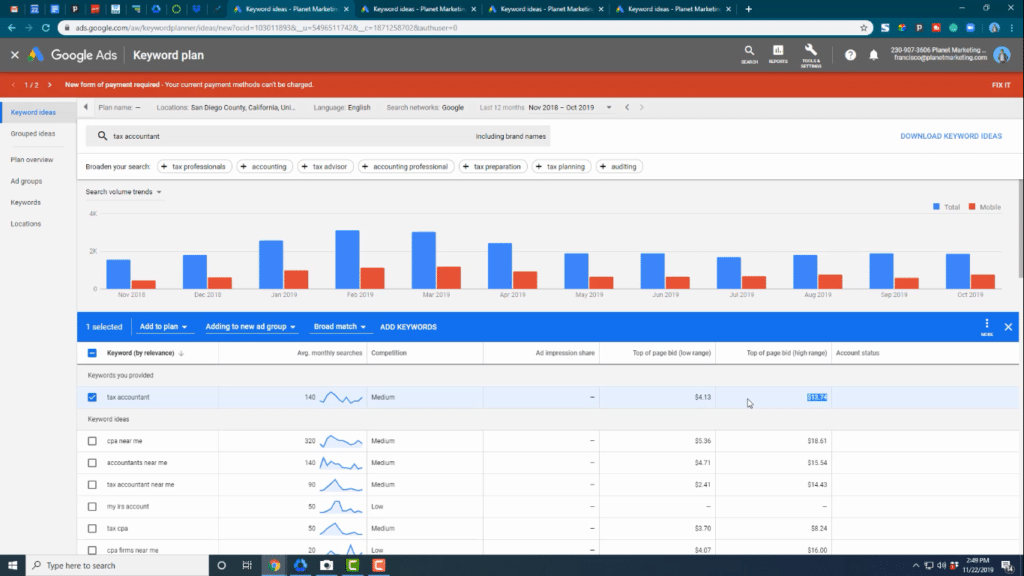
Thing is, people who type in “tax accountant” are usually looking for onetime deals. They are mostly individuals and companies who are looking for tax preparation services. So, is this keyword worthwhile for a small business? There is always the possibility, of course, that if you do a good job, you will turn the transaction into a long-lasting relationship. However, once off keywords are not something that I recommend that small businesses bid for. That all depends, of course, on the amounts that you charge per transaction.
“CPA near me,” is longer term
This keyword makes more sense. If I was a CPA, that means repeat business, because you are doing taxes and tax planning and all that stuff for a small business. So, you are looking at $5.36 to be at the bottom of the ads on the first page. And to be in first place, you are looking at about $18.61.
Personally, I don’t really look at those numbers. It’s not a deal breaker to me. I have got to look at profitability when I am working with my clients. Almost all the time, I never pay the money that’s given in the top of the range bid (high range). The money that I pay per click is normally lower. You have to pay those high amounts when you have horrible performing ads and your landing page sucks.
A higher Quality Score means you pay less
That’s because your landing page has a bearing on your ad’s quality score. If you have good ads, the history is there, people are clicking on your ads and people are interacting with your ad, Google will reward you and you won’t have to pay that much.
- Emergency Plumber
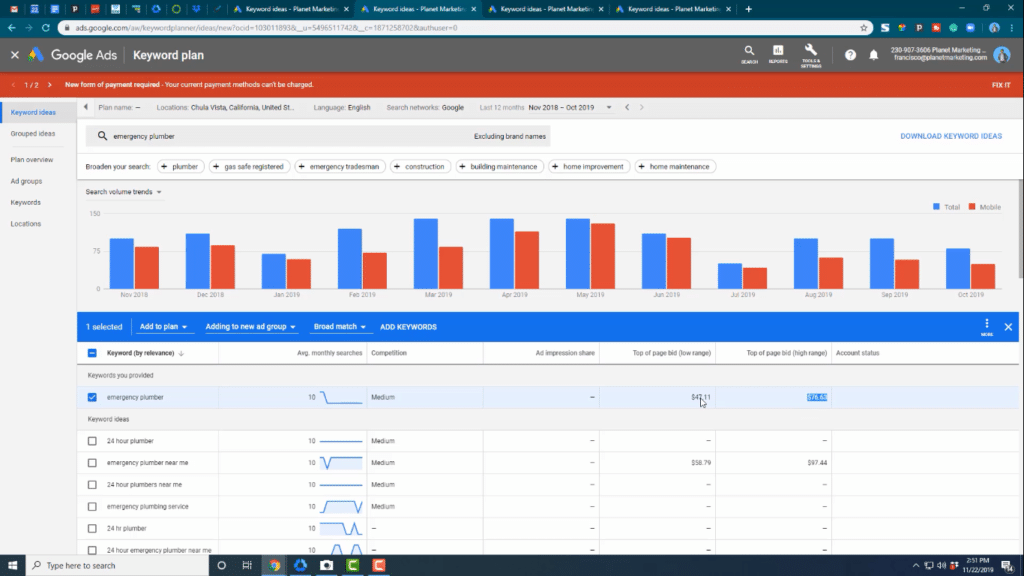
This is the second example of a small business that I am going to use in this article. Is it worth it for emergency plumbers to advertise on Google Ads? As you can see in the above screenshot, the bid for appearance on the first page on Google is an eye watering $47.11. And to be at the top, you need to bid at $76.63. But why is that the case? Why does this keyword attract such a premium top page bid?
It’s all about search intent
When you look at Google, the thing that you need to keep in mind is that it’s all about the search intent. Almost everyone who types some text into Google is looking for something! Google Ads exploits this to give people ads that relate to their search queries.
Everyone that goes to Google is looking to get information about one thing about the other, as already mentioned. However, what differs is the level of intent. Most people carry out searches because they are simply looking for some information. Maybe they wish to read the news or to find out if SpongeBob Squarepants is still alive (yes, many of the searches that are carried out are whammy).
A person who searches for “emergency plumber,” on the other hand, is probably knee deep in… ahem…mess. If you have sewage flowing out of your kitchen sink, you are going to have a very high search intent when you head over to Google. It’s an emergency, for crying out loud!
Now, this unfortunate individual is probably going to click on the very first ad that appears on their page. And chances are high that they will immediately pick up the phone to get you to come over to fix the mess! Hence there is greater competition for this type of keyword. People that carry out a search such as this one NEED to have something done. And they are willing to pay to have the job done as quickly as is possible.
Can small town plumbers bid for this keyword?
The answer to the above question is: it all depends on a number of circumstances:
- Your
callout fee - Your
hourly rate - The
distance to the location of the call
The cost for emergency plumbing services can be up to $475. It’s all going to be dependent on the nature of the job that needs doing, of course. If you are a small time plumber who only fixes leaky pipes, then this type of keyword is probably going to be beyond your reach. However, if you are a water damage restoration company, where the profit margins are $20,000, then this would clearly be worth your while. You can afford to bid all day even at the top of page bid (high bid).
So, it depends on how well you know your target audience. Who is going to call an emergency plumber? Probably someone whose washing machine has just busted its pipes and everything is leaking from the top floor to the bottom. The fire department is going to come out and they are going to do an emergency shutoff. And then who is there to clean up the mess? Not the fire department. They just make sure that nobody dies. The plumbing company will come through and take care of everything and fix the carpet and all that stuff. So, if your charges are high enough to enable you to break even, then you may compete for this keyword. Otherwise, you may wish to look at less competitive keywords.
- Real estate brokers
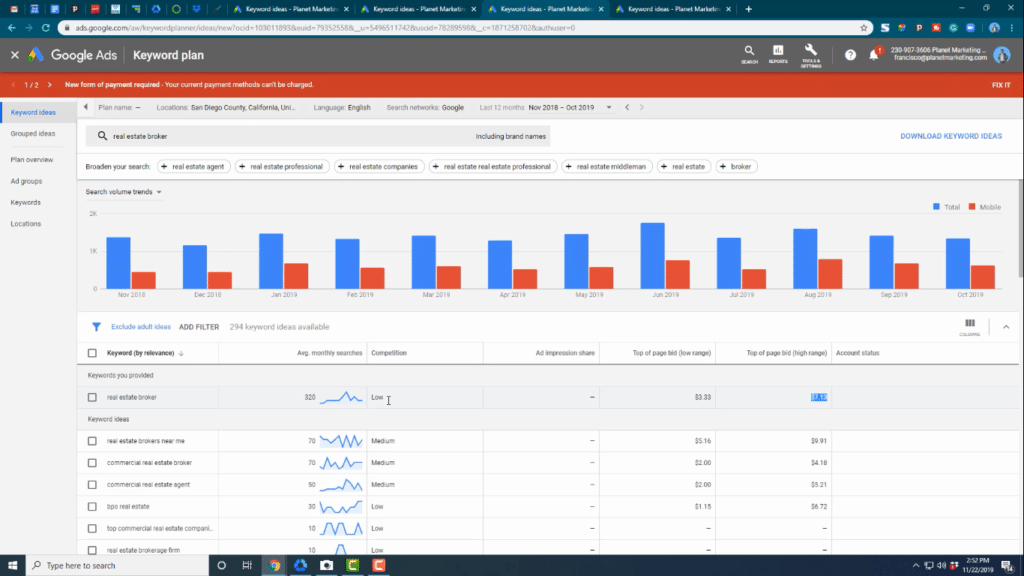
Real estate brokers are a favorite example of mine. So, let’s say you are in San Diego, and you are looking for a real estate broker. You can see some of the keywords in the above screenshot. Should that be the case, then your top page bid (low range) is going to be around $3.33. The top level bid (high range), on the other hand, is going to be around $7.13.
You will notice that the bid range is lower than is the case with plumbers. It doesn’t necessarily mean that plumbers are more important than real estate brokers. Or that they make more money. The whole thing, as already mentioned, has to do with intent. Someone who searches for “plumber near me,” probably needs one urgently, while a person who looks up a “real estate broker near me,” usually is in no such hurry. They are, therefore, likely to check out a number of brokers before settling on one.
Anyway, don’t be intimidated by the amounts that you see in Keyword Planner. As mentioned earlier, you are probably not going to be paying that much. Maybe at the very beginning, you will be paying that much, but that Cost per Click is going to go lower and lower, assuming that the ads that you write get clicks. Remember Google needs to make money. They only want to show ads that make them money. As an advertiser, you need to do the best job to get people from Google into your office.
Keyword ideas
Keyword ideas for “Real Estate broker” include:
- Real
estate broker near me - Commercial
real estate broker - Commercial
real estate agent - Top
commercial real estate companies
Localization and the “near me” phenomenon
Whenever you are carrying out keyword research, don’t forget to include the words “near me.” Over the past few years, this has become real popular. You will get things like: “coffee shop near me,” “bar near me,” “restaurant near me,” “real estate broker near me,” etc. People actually physically type that into Google when they are looking to get local results. If you think I am lying, then check out the above screenshot to see what I am talking about. On average, in San Diego County, California, up to 70 people per month look up “real estate broker near me.”
In this instance, advertising on Google is probably going to be worth it. Let’s assume that you land one of the clients via Google Ads. Most of the real estate brokers in San Diego charge a commission of up to $12,000! That’s a lot, considering that you will have paid between $5.16 and $9.91 to get that deal. That translates into a lot of profit!
Note that most small businesses are localized in nature. What this means is that they will only get customers from so many miles around them. If you are a plumber, as an example, you are probably only going to service an area of about five miles around your physical location. The same applies for bars. No one, in any case, is going to hire a plumber on the other side of the country, even if they are the best. And very few people are going to drive cross country just to get to a coffee shop or a bar.
- Motorcycle shipping
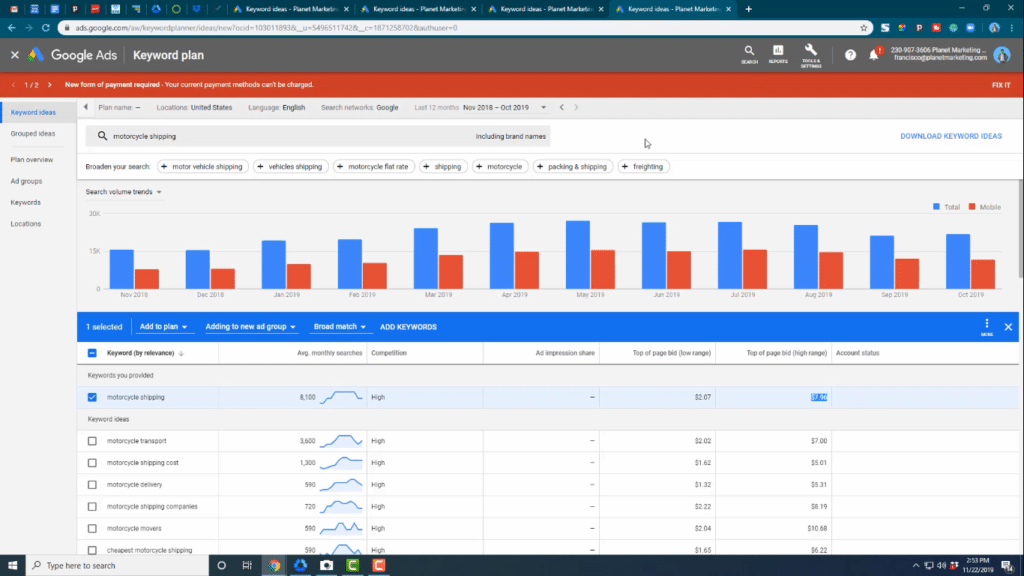
Anyway, let us move to another example. If you are in the motorcycle shipping industry, then you may be wondering whether or not Google Ads are for you. What is it that you can expect to pay per click for this type of industry? You will notice that this type of industry is a bit different from the examples that we have given so far in this article. A motorcycle shipping company can conceivably have campaigns that go nationwide or state-wide.
Maybe a lot of you are into insurance and you can sell anywhere in your state. So, what do you do in this situation? You don’t have to compete at a local scale. You compete on a nationwide scale. I like this example because I have a client who is in the industry and I bid for this specific keyword: “motorcycle shipping.”
What’s the CPC like?
You will notice that the CPC for this industry stands at $2.07 for the low end and $7.96 for the high end. Do I pay anywhere near $7.96? Hell no! And I am always at the top when it comes to Google Ads. In fact, I pay about half of that! So, I need to emphasize this point one more time; don’t think that the numbers that you see in Google’s Keyword Planner are going to be a deal breaker for you. Do your research. Start off very conservative.
Have a good landing page
Having a good landing page is something that I have already mentioned in this post. It’s doesn’t really make sense to spend all the time coming up with kickass Google Ads while neglecting your landing page. The landing page is key to making the conversion. Make sure that it is as professional as it can be! If you cannot do the job yourself, hire someone who can create a professional landing page on your behalf.
Not only should your landing page be well made, but it should be in sync with your ad in terms of keywords. But why is a landing page important? As noted earlier in this article, your landing page plays an important role in the quality score that your campaign gets from Google. The higher the quality score, the less the amount that you will have to pay for ads. In other words, a high quality score translates into a lower CPC, which means your advertising revenue will go a bit further. That’s of particular importance for small businesses!
Summary of Google Ads benefits for small businesses
Most people make the mistake of thinking that Google Ads is only for big players who can spend tens of thousands of dollars on marketing. Contrary to this belief, Google Ads does work for small businesses. This is something that I have tried to highlight using the above examples. It’s all going to depend on the industry, of course. Some industries are highly competitive when it comes to keywords. If you are in one of these, you may wish to go for less competitive keywords. What you are going to do is weigh whether the amount that you need to pay as your CPC bid can be recovered from the profits of making a sale. In some industries, such as real estate, that is clearly the case. If you land a single client, you can make up to $12,000 from an investment of around $3! The following are some of the ways through which Google Ads can help small businesses achieve growth:
- Google Ads allows for local targeting: This is something that has already been mentioned in this article. Google allows you to localize targeting for your ads, which increases the chances that they will attract a relevant potential audience.
- The PPC model works great for small businesses: One of the great things about Google Ads is that it uses the PPC model, which is great for small businesses. Instead of charging a fixed amount which may end up being too much, depending on the number of sales that you make, Google Ads charges you only when someone clicks on your ad.
- You get a wealth of metrics on your customers: Advertising via Google Ads provides you with a wealth of metrics on your customers. Which search phrases are they using on the platform and how much time do they, on average, spend on your landing page? With Google Ads, this information is available at your fingertips.
Get in touch to get started!
If you want to learn how to do Google Ads by yourself, and you can’t hire an agency, go to google.com and type in Google Ads certification. They have the whole program there teaching you how to do all this stuff. If you need help and are looking for an agency to handle this for you, feel free to reach out to me at planetmarketing.com. Hit me up on the contact form. I have my prices right there on my site at planetmarketing.com/pricing. So, we could shoot you a proposal. And then you can take that proposal and shop it around to a bunch of other PPC companies. You need somebody on your team who is going to bring you leads and sales. I normally bring in the leads for my clients. The sales people handle the sales part. That’s up to them! If they have great closing ratios; awesome! If not, your marketing campaigns won’t work.

